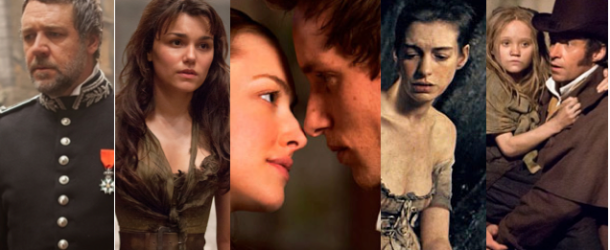
- Singing

- Costumes

- Direction

- Pace

- Acting

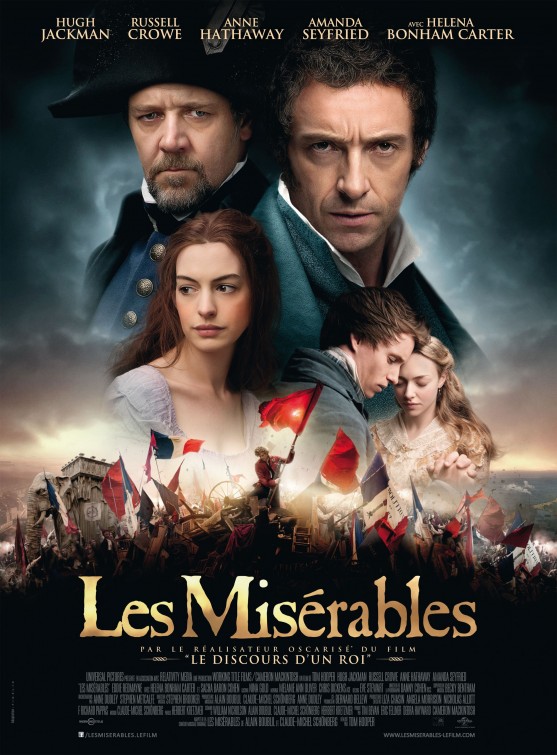 Director: Tom Hooper
Screenplay Writer(s): William Nicholson, Alain Boublil, Claude-Michel Schonberg, Herbert Kretzmer
Producer(s): Tim Bevan, Eric Fellner, Debra Hayward, Cameron Mackintosh
Actor(s): Hugh Jackman, Russell Crowe, Anne Hathaway, Amanda Seyfried, Eddie Redmayne, Helena Bonham Carter, Sacha Baron Cohen
Original Music: Claude-Michel Schonberg
Cinematographer: Danny Cohen
Editor(s): Melanie Ann Oliver, Chris Dickens
Director: Tom Hooper
Screenplay Writer(s): William Nicholson, Alain Boublil, Claude-Michel Schonberg, Herbert Kretzmer
Producer(s): Tim Bevan, Eric Fellner, Debra Hayward, Cameron Mackintosh
Actor(s): Hugh Jackman, Russell Crowe, Anne Hathaway, Amanda Seyfried, Eddie Redmayne, Helena Bonham Carter, Sacha Baron Cohen
Original Music: Claude-Michel Schonberg
Cinematographer: Danny Cohen
Editor(s): Melanie Ann Oliver, Chris Dickens
When bringing a staged musical to the big screen several issues need to be resolved; from 360 degrees of shooting as opposed to one angle, to rewriting characters for film instead of live dramatized theatre, it can be difficult to get the story to read just right. Fortunately, Les Miserables is able to create a strong atmosphere that doesn’t seem forced or awkward. While the the direction of Tom Hooper fell flat, the strength of the vocals really define Les Mis as a successful film adaptation.
Synopsis:
Based on the hit Broadway musical, which is in turn based off Victor Hugo’s 1862 French novel, Les Miserables tells the story of ex-prisoner Jean Valjean (Hugh Jackman) and his journey to escape the hindering life of a parolee. Constantly on the run from police inspector Javert (Russell Crowe), Valjean decides to take on a new identity as he starts a new life for himself, eventually becoming a town mayor.
Without being recognized by Javert, Valjean rescues an injured prostitute, Fantine (Anne Hathaway), from the inspector’s arrest. However, an unfortunate event leads to Valjean caring for Fantine’s daughter, Cosette (Isabelle Allen/Amanda Seyfried). Once Valjean hears of another man being arrested for his crimes, he must decide whether to give up his new life to save the innocent man or continue raising Cosette as a free man.
Les Miserables is the heartbreaking story of love, loss, hope and misery set over several years during a period of the French Revolution.
The Good
Anne Hathaway as Fantine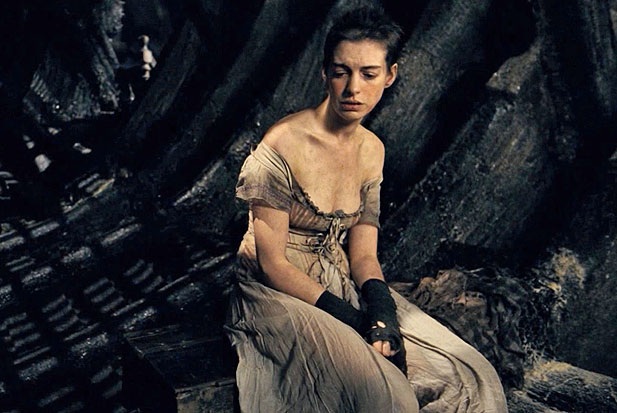
Though her screen time is brief, Anne Hathaway sure put on a show. Her training with legendary vocal coach Joan Lader months before filming allowed Hathaway to belt the end of “I Dreamed a Dream,” all while crying.
In an interview with WordAndFilm.com, Hathaway explains how hard it was for her to relate to the life full of loss and suffering that Fantine experiences; however, once she realized that sexual slavery exists even in our world today, she was able to consider her part not really as acting, but as her honoring the painful lives of the less fortunate. And it certainly showed.
In just one take Anne created what was one of the most dramatic and saddening scenes in the film. I wouldn’t be shocked if she won the Oscar Best Supporting Actress.
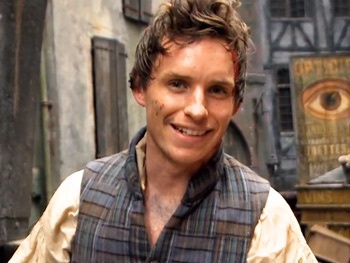 The Breakout Stars
The Breakout Stars
Eddie Redmayne as Marius Pontmercy
The absolute knock-out performance has got to be Eddie Redmayne. As an award winning Broadway star, it’s no wonder Redmayne thrived both vocally and theatrically as the love-struck Marius; his notes were strong, specifically his vibrato which was the most consistent of the entire cast.
When singing with a lot of passion, several actors let the ends of their words trail off, but not Redmayne. He was able to maintain acute enunciations while still conveying Marius’ anarchist defiance during all of his songs. Not only was his singing phenomenal, but he also delivered his lines with all the moxie and showmanship you’d expect from a young revolutionary. While I’ve only seen Redmayne in Hick, which I hated, after this stellar performance, I’m definitely interested to see his future projects.

Daniel Huttlestone as Gavroche
The other actor to look out for is definitely the 12-year-old virtually unknown actor Daniel Huttlestone as Gavroche, the street-smart helper of the revolutionaries.
Any time he sang or spoke, I just kept thinking “Who is this kid!” Turns out Huttlestone has been doing live theatre since the age of nine, playing the role of ‘Nipper’ in the 2009 production of Oliver! at the Theatre Royal Drury Lane as well as playing Gavroche in Les Miserables at the Queen’s Theatre.
Since the songs were sung live in the film rather than dubbed, I was dumbfounded as to how such a young actor was able to command such attention next to his supporting and leading cast. His talent was effortless, especially for singing so consistently while riding on the back of a carriage through cobble stone streets!
The Comedic Relief
Cohen and Carter as the Thenardiers 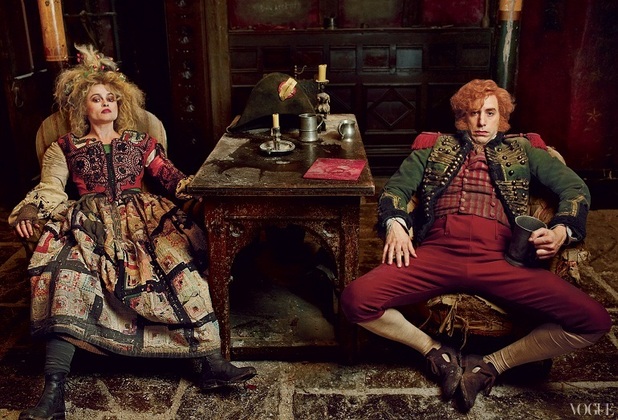
While I thought it would be difficult to take such a well known character actor like Sacha Baron Cohen seriously (thanks to Borat, Bruno, and Da Ali G Show), I was pleasantly surprised to find Cohen’s acting a bit more subtle.
Paired with the always amazing Helena Bonham Carter, the couple was hilarious as the money-hungry watchers of Cosette. The slapstick, obnoxious and cheeky duo were risqué enough to not draw too much attention to themselves while still providing nearly the only comedic moments in the somber film.
Cohen and Carter also starred opposite each other in another musical-turned-film titled Sweeney Todd. It’s obvious that the two gel together in their back and forth dialogue on screen.
The Ok
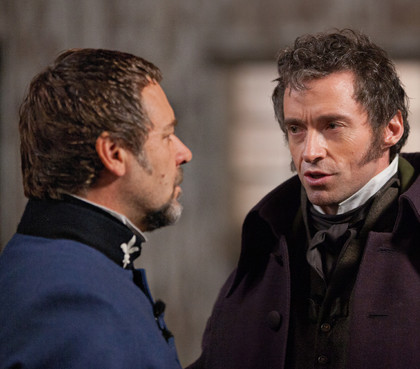 Hugh Jackman and Russell Crowe
Hugh Jackman and Russell Crowe
Hugh Jackman and Russell Crowe were by no means bad; their acting was convincing and generally true to the characters, but their vocals were lacking.
As the two main characters, Jackman and Crowe sing the most but struggled with notes and pitches. Jackman had a few noticeably off moments intermittent of his fairly strong vocals, but they were there. Although not detrimental to the film or his character, if you had seen him as Jean Valjean on Broadway, you’d be pissed.
Crowe on the other hand was able to sing with a little more consistency, although Javert’s songs were hardly as challenging as Valjeans. I felt his singing was true to his character and didn’t seem forced, but they also didn’t seem Broadway worthy. I can understand that it’s hard to follow in professional Broadway singers’ footsteps who often ooze perfection, but in comparison to the rest of the casts’ vocals, these two were noticeably weaker.
The Bad
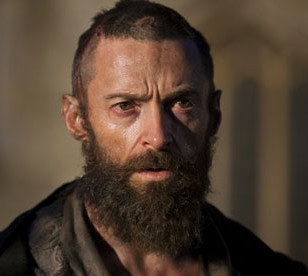 The Directing & Cinematography
The Directing & Cinematography
Director Tom Hooper is known for his signature framing techniques and varying focal lengths which have been successful in films such as John Adams and The King’s Speech. Unfortunately, some of his extreme angles were overshadowed by stagnant, extreme close-ups during solo ballads in Les Miserables.
In many instances, the camera would simply stop for what seemed like minutes at a time, focusing on just one character’s face while they sang. It became predictable and really slowed down the film’s pace.
Cinematographer Danny Cohen worked with Hooper on The King’s Speech which earned him an Oscar nomination for Best Cinematographer but he really flopped with Les Mis. There were a few saving graces, such as when the camera would pan out from the close up of a character’s eyelashes all the way to a huge landscape, but it was the scenes during solo songs where I got lost and bored. The film was so full of strong voices and scenery, that I didn’t understand the purpose of stillness. In short, the cinematography failed to translate the live theater aspect into film in a successful way.
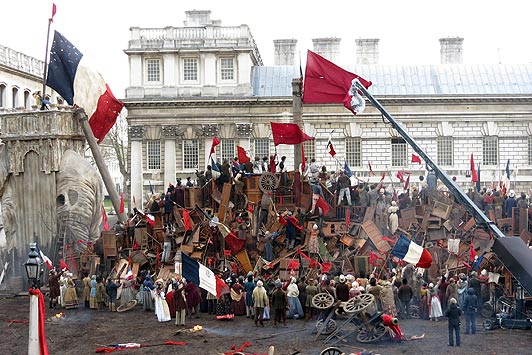 A Lack of Grandiose
A Lack of Grandiose
Above all, Les Miserables is a musical so there should be a sense of a grand orchestra, and this film was lacking in that department. While the music was great and the score was nicely inserted, more could’ve been done with the orchestra.
In a film you have the option of surround sound, and for something with so many instruments involved, I can’t imagine why it wasn’t utilized. The powerful moments of music, whether vocal or background sound, was held back, and as a result, the film lacked the grand feeling of a true musical.
I was expecting varying levels of sound to show emphasis and build suspense, but instead was left with mostly middle volumes the entire time. I wanted to feel like the orchestra was surrounding me, but the orchestra seemed detached from the story and its characters.
Overall: 4 out of 5 Stars
All in all, Les Miserables is definitely a very good movie, but with all the hype I was a bit underwhelmed. Overall, the vocals are strong as was the acting, and with a cast that size, I was impressed with the apparent camaraderie.
Unfortunately, Hooper seems to have been a mismatched choice for the film and his style often took away from some of the more successful elements. Les Miserables will make you cry if you let it, but it will also make you smile and want to keep watching. Despite some of the film’s downfalls, Les Mis will definitely earn several Oscar nominations.

